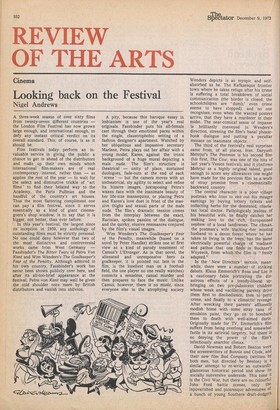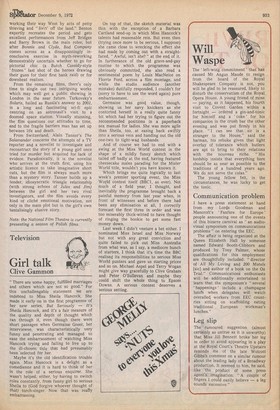Cinema
Looking back on the Festival
Nigel Andrews
A three-week season of over sixty films from twenty-seven different countries — the London Film Festival has now grown large enough, and international enough, to defy any instant critical verdict on its overall standard. This, of course, is as it should be.
Film festivals today perform an invaluable service in giving the public a chance to get in ahead of the distributors and make up their own minds which international film-makers are of real contemporary interest, rather than — as applies the rest of the year — to wait for the select and diminutive trickle of ' art films ' to find their belated way to the Academy, the Paris Pullman and the handful of the country's art houses. Thus the most flattering compliment one can pay a film festival, since it serves essentially as a kind of giant cinemagoers's shop window, is to say that it is bigger, not better, than ever before.
In this year's festival, the largest since its inception in 1959, any anthology of outstanding films must be strictly personal. No one could deny however that two of the most distinctive and controversial works came from West Germany — Fassbinder's The Bitter Tears of Petra Von Kant and Wim Wenders's The Goalkeeper's Fear of the Penalty. Although admired in his own country, Fassbinder's work has never been shown publicly over here, and after its all-too-brief appearance at the festival, Petra von Kant may well be given the cold shoulder once more by British distributors and vanish into oblivion.
A pity, because this baroque essay in lesbianism is one of the year's real originals. Fassbinder puts his all-female cast through their emotional paces within the single, claustrophobic setting of a fashion designer's apartment. Watched by her ubiquitous and impassive secretary Marlene, Petra plays out her affair with a young model, Karen, against the ironic background of a huge mural depicting a male nude. The film's structure is theatrical — unity of place, sustained duologues, fade-outs at the end of each 'scene' — but the camera moves with an untheatrical, sly agility to select and refine its bizarre images, juxtaposing Petra's waxen face with the inanimate beauty of her life-size mannequins, or placing Petra and Karen's love duet in front of the massive thighs and sexual parts of the male nude. The film's dramatic tension comes from the interplay between the exact, Racinian, spoken passion of the dialogue, and the quirky, elusive resonances conjured by the film's visual images.
Wim Wenders's The Goalkeeper's Fear of the Penalty, meanwhile (based on a novel by Peter Handke) strikes one at first view as a kind of parody treatment of Camus's L'Etranger. As in that novel, the alienated and unresponsive hero (a goalkeeper, it is pointed out late in the film, is the loneliest man on a football field, the one player no one really watches) commits a senseless, casual murder and then prepares to face the music. Unlike Camus, however, there is no music, since everyone else in the atrophying society Wenders depicts is as myopic and selfabsorbed as he. The Kafkaesque frontier town where he takes refuge after his crime is suffering a total breakdown of social communication (the border is closed, the schoolchildren are 'dumb,' even crime seems to have stopped), and no one recognises, even when the wanted posters arrive, that they have a murderer in their midst. The near-comical sense of impasse is brilliantly conveyed in Wenders's direction, stressing the film's banal phrasehook dialogue and putting a peculiar menace on inanimate objects.
The third of the festival's real surprises came from, of all places, Iran. Daryush Mehrjui's The Postman is his second film (his first, The Cow, was one of the hits of last year's Venice festival), and it confirms Mehrjui as a highly original talent, good enough to scorn any allowances one might' have made for the previous film as a work of stray promise from a cinematically backward country.
The central character is a poor village postman who tries to eke out his meagre earnings by buying lottery tickets and collecting herbs for the demented, charlatan local doctor. Pathologicaly jealous of his beautiful wife, he finally catches her making love to the -rich, Europenised nephew of a local landowner. The climax, the postman's wife tracking -her missing husband to a dense, forest where he has taken to living in the trees, has the same electrically powerful charge of madness and pathos that one finds in Buchner's Woyzeck, from which -the film is "freely adapted."
In the New Directors' section, meanwhile, there were a number. of striking debuts. Klaus Emmerich's Rosa and Lin is a cautionary fable portraying the disastrous effects of a trendy-liberal upbringing on two pre-pubescent children whose weak and vacillating parents drive them first to disobedience, then to petty crime, and finally to a climactic revenge. After wrecking their parents' affluently modish home with some stray cans of emulsion paint, they go on to bombard them to death with well-aimed darts. Originally made for TV, Emmerich's film suffers from being overlong and somewhat facile in its satirical targetry, but there is no denying the power of the film's infectiously anarchic climax.
David Newman and Robert Benton were the screenwriters of Bonnie and Clyde, and their new film Bad Company (written bY both men, but directed by Benton) is a similar attempt to re-write an outwardly glamorous historical period and show its socially subversive underside. This time it is the Civil War, but there are no colourful John Ford battle scenes, only the inpoverished and picaresque adventures of a bunch of young Southern draft-dodgers working their way West by acts of petty thieving and " livin' off the land." Benton expertly recreates the period and gets excellent performances from Jeff Bridges and Barry Brown in the main roles; but after Bonnie and Clyde, Bad Company comes across as a disappointingly inconclusive exercise in myth-reworking demonstrably uncertain whether to go for pictorial chic (a Butch Cassidy-style ' frozen ' last 'shot of the heroes drawing their guns for their first bank raid) or for downbeat realism.
From the remaining films, there's only time to single out two intriguing works which may well get a public showing in London in the near future. Tarkovsky's Solaris, hailed as Russia's answer to 2001, is a long and fascinating' sci-fi epic centring on an astronaut's visit to a doomed space station. Visually stunning, the film questions our attitudes to time, and to the fragile barriers man has set up between life and death.
From Switzerland, Alain Tanner's The Salamander concerns the attempts of a TV reporter and a novelist to investigate and reconstruct the story of a young girl once tried for murder but acquited for lack of evidece, Paradoxically, it is the novelist who arrives at the truth first, using his artistic licence to take imaginative short cuts, but the film is always much more than a mystery story. Tanner builds up a tender, idiosyncratic triangle relationship (with strong echoes of Jules and Jim) between the girl and her two rival investigators, and the film avoids every kind of cliche emotional motivation, not only in the main plot but in the girl's own tantalisingly elusive story.
Note: the National Film Theatre is currently presenting a season of Polish films.











































 Previous page
Previous page